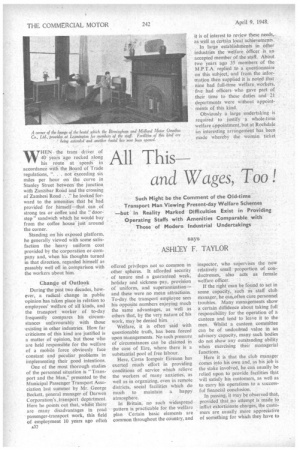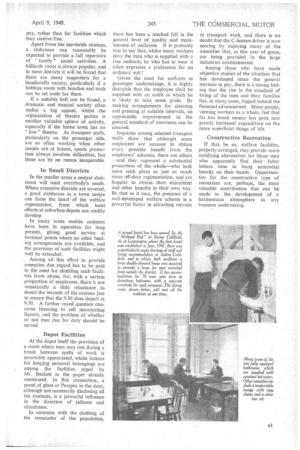All This
Page 34

Page 35

If you've noticed an error in this article please click here to report it so we can fix it.
and Wages, Too !
says
ASHLEY F. TAYLOR
WHEN . the tram driver of 40 Years ago rocked along his route' at speeds' in accordance with.the Board of Trade regulations, ". . . not exceeding six miles per hour on the curve in Stanley Street between the junction with Zanzibar Road and the crossing of Zambesi Road ...." he looked forward to the amenities that he had provided for himself—that can of strong tea or coffee and the " door-. step " sandwich which he would buy from the coffee house just around the corner.
Standing on his exposed platform, he generally viewed with some satisfaction the heavy uniform coat provided by the corporation or-company and, when his thoughts turned in that direction, regarded himself as passably well off in comparison with the workers about him.
Change of Outlook
During-the past two decades, however, a radical change in public opinion has taken place in relation to employees' welfare of all kinds, and the transport worker of to-day frequently compares his circumstances unfavourably with those existing in other industries. How far criticisms of this kind are justified is a matter of opinion, but those who are held responsible for the welfare of a mobile force obviously face constant and peculiar problems in implementing their good intentions.
One of the most thorough. studies of the personnel situation is "Transport and the Man," presented to the Municipal Passenger Transport Association last summer by Mr. George Beckett, general manager of Darwen Corporation's transport department. Here he points out that, whilst there are many disadvantages in road passenger-transport work, this field of employment 10 years ago often A32 offered privileges not so common in other spheres. It afforded security , of tenure and a guaranteed week: holiday and sickness pay, provision of uniform, and superannuation— and these were no mean attractions. To-day the transport employee sees his opposite numbers enjoying much the same advantages, as well as others that, by the very nature of his work, may be denied him. .
Welfare, it is often said with questionable truth, has been forced upon managements. No such pressure of circumstances can be claimed in the case of Eire, where there is a substantial pool of free labour.
Here, Coras Iompair Eireann has exerted much effort in providing conditions of service which relieve the workers of many anxieties, as well as in organizing, even in remote districts, social facilities which do much to maintain a happy atmosphere.
In Britain, no such widespread pattern is practicable for the welfare plan Certain basic elements are common throughout the country, and it is of interest to review these needs, as well as certain local achieyements.
In large establishments in other industries the welfare officer is an accepted member of the staff. About two years ago 35 members of the M.P.T.A. replied to .a questionnaire on this subject, and from the information then supplied it is noted that nine had full-time welfare workers, five had officers who gave part of their time to these duties and 21 departments were without appointments of this kind.
Obviously a large undertaking is required to justify a• whole-time welfare appointment, but at Rochdale an interesting arrangement has been made whereby the woman ticket inspector, who supervises the now relatively small proportion of conductresses, also acts as female welfare officer.
If the right man be found to act in some capacity,. such as staff club manager, he cansoften cure personnel troubles. Many managements show a certain diffidence about taking full responsibility for the operation of a canteen and tend to leave it to the men. Whilst a canteen committee can be of undoubted value in an advisory capacity, many such bodies do not show any outstanding ability when exercising their managerial functions.
Here it is that the club manager comes into his own and, as his job is the stake involved, he can usually be relied upon to provide facilities that will satisfy his customers, as well as to carry his operations to a successful financial conclusion. .
In passing, it may be observed that, provided that no attempt is made to inflict extortionate charges, the customers are usually more appreciative of something for which they have to pay, rather than for facilities which they receive free.
Apart from the inevitable canteen, a clubroom can reasonably be expected to provide a full repertoire of " family " social activities. A billiards room is always popular, and in most .districts it will be found that there are many supporters for a handicrafts society, particularly if a hobbies room with benches and tools can be set aside for them.
If a suitable hall can be found, a dramatic and musical society often makes a big appeal, whilst the organization of theatre parties is another valuable sphere of activity, especially if the home town has no " live " theatre. As transport staffs, particularly on the passenger side, are so often working when other people are at leisure, sports promotion always involves difficulties, but these are by no means insuperable.
In Small Districts
In the smaller areas a central clubroom will meet everybody's needs. Where extensive districts are covered, a good clubhouse in a town centre can form the heart of the welfare organization, from which local efforts at suburban depots can readily develop.
In many areas mobile canteens have been in operation for long periods, giving good service at terminal points where no other feeding arrangements are available, and the provision of such facilities might well be extended.
. Among all this effort to provide amenities due regard has to be paid to the need for shielding such facilities from abuse, for, with a certain proportion of employees, there is not unnaturally a little reluctance to desert the warmth of the canteen just to ensure that the 9.30 does depart at 9.30. A further vexed question concerns licensing to sell intoxicating liquors, and the problem of whether or not men due for duty should be served
Depot Facilities
At the depot itself the provision of a room where men may rest during a break between spells of work is invariably appreciated, whilst lockers for keeping personil belongings are among the facilities urged by Mr. Beckett in the paper already mentioned. In this connection, a panel of glass or Perspex in the door, _although not necessarily disclosing all the contents, is a powerful influence in the direction of ,fidiness and cleanliness.
In common with the clothing of the remainder of the population, there has been a marked fall in the general level of quality and maintenance of uniforms. It is probably true to say that, whilst many workers envy the man who is supplied with a free uniform, he who has to wear it often expresses a preference for an ordinary suit Given the need for uniform in passenger undertakings, it is highly desirable that the employee shall be supplied with an outfit in which he is likely to take some pride. By making arrangements for cleaning and pressing at suitable intervals, an appreciable improvement in the general standard of smartness can he ensured.
Inquiries among selected transport staffs show that although some employees are anxious to obtain every possible benefit from the employers' schemes, there are others --and they represent a substantial proportion of the whole—who look upon such plans as just so much more off-duty regimentation, and are happier to obtain their enjoyment and other benefits in their own way. Be that as it may, the presence of a well-developed welfare scheme is a powerful factor in attracting recruits to transport work, and there is no doubt that the C-licence driver is now scoring by enjoying many of the amenities that, in this year of grace, are being provided in the large industrial establishments.
Among those who have made objective studies of the situation that has developed since the general increase in pay, there is a strong feeling that the rise in the standard of living of the men and their families has, in many cases, lagged behind the financial advancement. Many people, viewing workers as a whole, feel that far too much money has gone into greatly increased expenditure on the more superficial things of life.
Constructive Recreation
If that be so, welfare facilities, properly arranged, may provide more satisfying alternatives for those men who apparently find their fuller leisure time to hang somewhat heavily on their hands. Opportunities for the constructive type of recreation are, perhaps, the most valuable contribution that can be made to the development of a harmonious atmosphere in any business undertaking.




















































































